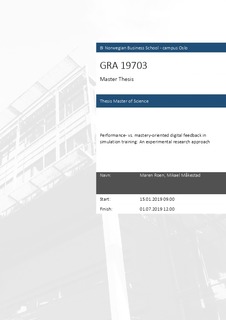| dc.description.abstract | This study inspects the potential relationships between performance-, and
mastery-orientated digital feedback, and perceptions of fairness, and relevance of
feedback received during simulation training. We also included self-efficacy as a
possible moderating variable. Using established theory and research on the
construct of performance-, and mastery-oriented feedback, fairness and relevance
and self-efficacy, we derived at 7 testable hypotheses that are exposed to
empirical examination. We tested our hypotheses using a quasi-experimental
posttest design with two conditions, where the digital feedback provided to the
trainees by the simulator was manipulated. One group received performanceoriented
digital feedback, and the other received mastery-oriented digital
feedback.
Our results indicated a positive relationship between self-efficacy and
perceptions of feedback relevance. Otherwise our hypotheses received no support,
as statistically significant differences were not found, and we can therefore not
make any causal inference about the relationship between performance and
mastery oriented digital feedback and perceptions of fairness and relevance of
feedback during training. Patterns did emerge from our data, indicating slightly
more positive perceptions of feedback in the PODF group, compared to the
MODF group, however not at a significant level.
Possible explanations for the non-significant findings are discussed, where
the lack of an adequately sized sample, non -randomized assignment to the
experiment groups and operationalization of the two conditions of the experiment,
are brought forth as important, unfavorable factors. A potential practical
implication of this thesis is how feedback might be distributed in organizations,
and a potential theoretical implication is presenting a novel combination of the
included variables in hypothesizing certain relationships, in light of a
computerized simulator. | nb_NO |
